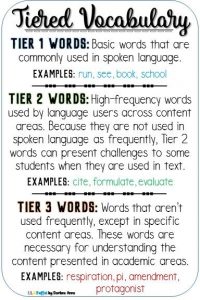What Are Tier 2 Words?
Peter Kruger has a good explanation. 
He states: Tier 2 words are high-frequency words used by mature content users over a variety of content domains. More simply, they are words that are frequent enough that most native speakers would know what they mean, but usually require explicit instruction (having to look them up in a dictionary, or apply context referencing, etc.) They lack redundancy in the language, but are not so specialized as to be jargon or unique to specific contexts. They are often spelled in ways that don’t phonetically follow the simple rules of English grammar and may be challenging for emerging vocabulary learners who know how to say the word, but have difficult trying to read them due to irregular or alternative phonetic grammar rules. Tier 2 words are words such as obvious, complex, reasoned, national, or informed.
In contrast, Tier 1 words are extremely common, almost ubiquitous-frequency words that require little or no explicit instruction. They are usually root words themselves and are not typically modified with prefixes and suffixes. They are usually phonetically very easy to read and pronounce from reading. Words like baby, clock, or run are tier 1 words.
Tier 3 words are extremely specialized, require explicit instruction, are relatively low-frequency, and are usually limited to a content domain, like medical or engineering terminology. They frequently are composed of foreign language roots modified with suffixes and prefixes. These are words such as misappropriated, atrioventricular tachycardia, or antidisestablishmentarianism.
The reason for the shift away from the idea of “grade-level” vocabulary towards this tiered structure with specific criteria is because many readers do not advance at the same pace. Making this learning explicit to students also helps them understand why certain words are more challenging to them, and helps them focus on certain words they need to develop as a base for more challenging vocabulary. They may need to develop different reading strategies for different tiers of words. Tier 1 words are typically “sight words,” while tier 3 words are typically “even the teacher had to look that up!”